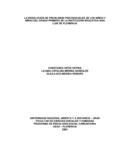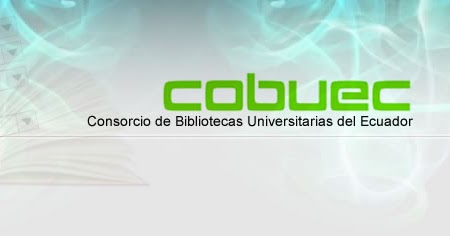Mostrar el registro sencillo del ítem
La resolución de problemas psicosociales de los niños y niñas del grado primero de la institución educativa San Luis de Florencia
| dc.contributor.advisor | Delia Amparo, Triana Bolivar | |
| dc.coverage.spatial | cead_-_florencia | spa |
| dc.creator | Ortiz Ospina, Constanza | |
| dc.creator | Medina Gonzalez, Liliana | |
| dc.creator | Medina Rengifo, Olga Lucia | |
| dc.date.accessioned | 2018-08-30T21:19:55Z | |
| dc.date.available | 2018-08-30T21:19:55Z | |
| dc.date.created | 2004 | |
| dc.identifier.uri | https://repository.unad.edu.co/handle/10596/19886 | |
| dc.description.abstract | El proyecto como tal, parte de la idea de que los conflictos entre los niños y niñas del grado primero de la institución educativa San Luis se pueden aprovechar como espacios para que desde la familia y la institución educativa se le construya sentido a los valores que propenden por la convivencia. Para nadie es un secreto que los niños y niñas por su misma naturaleza humana, difieren en comportamientos y son más susceptibles que en cualquier otra edad, a verse involucrados en conflictos que generalmente se convierten en espacios para alimentar antivalores como el egoísmo, la intolerancia, el irrespeto, etc. También es verdad que tanto en el seno de la familia como en la institución educativa, los conflictos en el que se involucran los niños y niñas generalmente son vistos en el marco de comportamientos patológicos de la personalidad y por lo tanto casi siempre las estrategias tienden a prevenirlos y no a sacarle provecho para contribuir a una formación más integral. Es por eso que para una mejor orientación del proceso de investigación se formula el problema a partir de los siguientes interrogantes: ¿Cómo puede explicarse desde los fundamentos de la psicología social comunitaria la falta de sociabilidad entre los niños y niñas recién ingresados a la etapa escolar? ¿Cuáles son los factores que a nivel de interrelaciones tanto en la familia como en la escuela están incidiendo en la falta de sociabilidad entre los niños y niñas del grado primero de la Institución Educativa San Luis? ¿Por qué a los padres de familia y a la escuela se les dificulta coordinar acciones tendientes a mejorar la sociabilidad de los niños y niñas que recién ingresan a la Institución Educativa San Luis? ¿Cuál es la estrategia más pertinente para que los padres de familia contribuyan conjuntamente con la escuela a fortalecer la sociabilidad de los niños y niñas del grado primero de la Institución Educativa San Luis? A partir del interés por despejar los interrogantes anteriores, el proyecto tiene como objetivos generales, por un lado, establecer los fundamentos teóricos que tanto a nivel de la psicología social comunitaria como del perfil temático de la investigación ayudan a explicar la dimensión del problema abordado. De esta manera se orienta la investigación hacia el estudio de las relaciones del niño y de la niña tanto en la familia como en la escuela, para posteriormente sí diseñar e implementar una propuesta alternativa que sobre la base de fortalecer las relaciones familia – escuela, contribuya a que los niños y niñas del grado primero de la Institución Educativa San Luis aprendan a solucionar sus conflictos en forma pacífica. Por su parte, la justificación de la propuesta se hace en términos de la posibilidad que existe para abordar los problemas suscitados en los procesos de socialización, desde la articulación de los conocimientos psicológicos y sociológicos partiendo de la teoría que plantea que el origen de la diversidad de comportamientos de la persona está en el tipo de relaciones que se establecen con los demás y no en la herencia o cualquier otro factor intrínseco de la persona. Igualmente adquiere importancia la novedad de la propuesta, en tanto que por un lado se fundamenta en la ética de mínimos o ética civil que propone, entre otras cosas, que desde cualquier núcleo social es posible generar espacios para construirle sentido a los valores y a la creación de normas y por otro lado adopta la estrategia de solución de conflictos sin perdedores, en la que los niños y niñas asumen el rol de jueces de sus propias comportamientos en el marco de la comunidad donde viven. Se puede decir que estos planteamientos se corresponden tanto con lo que a nivel de el enfoque psicológico como de enfoque de investigación se asume en la investigación intervención. A nivel psicológicos se tiene en cuenta el enfoque humanístico y el enfoque socio-constructivista. En lo que a enfoque de investigaciones refiere, se acoge el enfoque crítico – social, el cual se desarrolla a través de la modalidad investigativa de la Investigación Acción Participativa –IAP. Se escogieron estos enfoques porque si se hace a simple vista una comparación entre las escuelas psicológicas del humanismo el socio-constructivismo en el marco de la psicología social comunitaria, así como de la filosofía del Programa de Psicología social comunitaria, se puede advertir fácilmente que el enfoque que mejor se complementa en torno al objeto y problema de investigación que ocupa el presente estudio, es precisamente el enfoque crítico-social, en la medida que permite orientar el proceso tanto a la reflexión sobre el quehacer de la persona en la solución de los problemas del grupo social, como al reconocimiento de su posibilidad y desarrollo de procesos autogestionarios que conduzcan a su liberación tanto espiritual como material. En la medida que el conjunto de acciones que se adelantaron tanto con los estudiantes como con los docentes y padres de familia, fueron el producto de acuerdos mutuos entre los involucrados, se puede decir que el abordaje de la comunidad es de tipo externo, lo cual quiere decir que el proceso se enmarca dentro de lo institucionalmente acordado y no obedece a requerimientos sugeridos o planteados desde afuera. La población de la investigación corresponde a los 2 grupos del grado primero de la Institución Educativa San Luis, los cuales son 48 estudiantes, sus dos docentes y los padres de familia. Sin embargo, el trabajo de campo se lleva a cabo con 26 estudiantes distribuidos en los dos grupos del grado primero, así como sus respectivos docentes y tanto padres como madres de familia. Esos son los estudiantes cuyos casos se consideraron como los de mayor dificultad para solucionarlos y por lo tanto, ha sido en ellos y en sus padres y madres en quienes se ha centrado la atención. A través de historias de vida de los estudiantes y entrevistas tanto con los padres como con los docentes del grado primero, se logró establecer que los niños y niñas viven en un ambiente familiar y escolar que se ve afectado por actitudes que estimulan la intolerancia. En el hogar no solo los padres se ven involucrados en conflictos entre sí, sino que dichos conflictos ahondan la incomprensión de las parejas y repercute en el mal trato frente a sus hijos, notándose violencia expresada tanto a nivel verbal como físicamente. En la institución educativa no se tiene en cuenta la situación particular que vive cada niño y niña en casa, se ignora su problemática y así, los niños y niñas terminan perdiendo interés hasta en el estudio. Frente a esta situación, se adelantaron actividades de intervención que a manera de talleres y jornadas de integración que permitieron trabajar sobre las múltiples formas de violencia de que son objeto los niños y niñas, los derechos de los niños y niñas, técnicas de resolución de conflictos y la importancia del reconocimiento de la naturaleza del niño, según su desarrollo evolutivo. Dentro de las conclusiones, se destaca el planteamiento en torno a que, la propuesta investigativa se constituyó en una oportunidad para que tanto docentes como padres de familia de la Institución Educativa San Luis y estudiantes del Programa de Psicología Social Comunitaria involucrados en la experiencia, profundizaran en el conocimiento de los problemas psicosociales de los estudiantes del grado primero de la Institución Educativa San Luis, pero además se lograra entre institución educativa y padres de familia, fortalecer una red de trabajo que permitiera experimentar nuevas formas de ver la relación entre adultos, niños y niñas, sin detrimento de la autonomía y de la naturaleza de niño y de la niña, como ser humano en pleno desarrollo y expuesto a múltiples influencias que determinan en mayor o menor grado, según cada contexto cultural, sus comportamientos con las demás personas con quien vive. | spa |
| dc.format | spa | |
| dc.format.mimetype | application/pdf | spa |
| dc.language.iso | spa | spa |
| dc.publisher | Universidad Nacional Abierta y a Distancia UNAD | spa |
| dc.title | La resolución de problemas psicosociales de los niños y niñas del grado primero de la institución educativa San Luis de Florencia | spa |
| dc.type | Proyecto aplicado | spa |
| dc.subject.keywords | Educación de niños | spa |
| dc.subject.keywords | Psicología social | spa |
| dc.subject.keywords | Talleres escolares | spa |
| dc.description.abstractenglish | The project like such, it leaves of the idea that the conflicts between the children and girls of the first grade of the educational institution San Luis can take advantage as spaces so that from the family and the educational institution is built sense to the values that propenden for the coexistence. For anybody it is a secret that the children and girls for their same human nature, differ in behaviors and they are more susceptible than in any other age, to it turns involved in conflicts that generally become spaces to feed antivalores like the selfishness, the intolerance, the irrespeto, etc. is Also true that so much in the breast of the family like in the educational institution, the conflicts in which the children are involved and girls are generally seen in the mark of pathological behaviors of the personality and therefore the strategies almost always spread to prevent them and not to take out him profit to contribute to a more integral formation. It is for that reason that for a better orientation of the investigation process the problem is formulated starting from the following queries: How can it be explained from the foundations of the community social psychology the lack of sociability between the children and girls recently entered to the school stage? Which are they the factors that at level of interrelations as much in the family as in the school are impacting in the lack of sociability between the children and girls of the first grade of the Educational Institution San Luis? Why to the family parents and the school they are hindered to coordinate actions tendientes to improve the sociability of the children and girls that newly enter to the Educational Institution San Luis? Which is the most pertinent strategy so that the family parents contribute jointly with the school to strengthen the sociability of the children and girls of the first grade of the Educational Institution San Luis? Starting from the interest to clear the previous queries, the project has as general objectives, on one hand, to establish the theoretical foundations that so much at level of the community social psychology as of the thematic profile of the investigation they help to explain the dimension of the approached problem. This way the investigation is guided toward the study of the boy's relationships and of the girl as much in the family as in the school, it stops later on yes to design and to implement an alternative proposal that it has more than enough the base of strengthening the relationships family - school, contribute to that the children and girls of the first grade of the Educational Institution San Luis learns how to solve his conflicts in peaceful form. On the other hand, the justification of the proposal is made in terms of the possibility that exists to approach the problems raised in the socialization processes, from the articulation of the psychological and sociological knowledge leaving of the theory that outlines that the origin of the diversity of the person's behaviors is in the type of relationships that they settle down with the other ones and not in the inheritance or the person's other intrinsic factor. Equally he/she acquires importance the novelty of the proposal, as long as on one hand it is based in the ethics of minima or civil ethics that it proposes, among other things that it is possible to generate spaces to build him sense to the values and the creation of norms from any social nucleus and on the other hand it adopts the strategy of solution of conflicts without losers, in the one that the children and girls assume the list of judges of their own behaviors in the mark of the community where they live. One can say that these positions belong together so much with that that at level of the psychological focus as of investigation focus it is assumed in the investigation intervention. At psychological level one keeps in mind the humanistic focus and the focus partner-constructivista. In what refers to focus of investigations, the critical focus is welcomed - social, which is developed through the investigative modality of the Investigation Action Participativa - IAP. These focuses were chosen because if one makes a comparison at first sight among the psychological schools of the humanism the partner-constructivismo in the mark of the community social psychology, as well as of the philosophy of the Program of community social Psychology, he/she can notice himself easily that the focus that better it is supplemented around the object and investigation problem that it occupies the present study, it is in fact the critical-social focus, in the measure that allows to guide the so much process to the reflection on the person's chore in the solution of the problems of the social group, like to the recognition of their possibility and development of processes autogestionarios that lead to their liberation so much spiritual as material. In the measure that the group of actions that they were ahead as much with the students as with the educational ones and family parents, they were the product of mutual agreements among those involved, one can say that the boarding of the community is of external type, that which means that the process is framed institutionally inside the agreed and it doesn't obey suggested requirements or outlined from out. The population of the investigation corresponds to the 2 groups of the first grade of the Educational Institution San Luis, which are 48 students, her two educational and the family parents. However, the field work is carried out with 26 students distributed in the two groups of the first grade, as well as its respective ones educational and as much parents as family mothers. Those are the students whose cases were considered as those of more difficulty to solve them and therefore, it has been in them and in their parents and mothers in who the attention has been centered. Through histories of the students' life and interviews as much with the parents as with the educational of the first grade, it was possible to settle down that the children and girls live in a family and school atmosphere that is affected by attitudes that stimulate the intolerance. In the non alone home the parents are involved to each other in conflicts, but rather this conflicts deepen the incomprehension of the couples and it rebounds in the wrong treatment in front of their children, being noticed expressed violence so much at verbal level as physically. In the educational institution one doesn't keep in mind the particular situation that lives each boy and girl at home, their problematic one it is ignored and this way, the children and girls finish losing interest until in the study. In front of this situation, they were ahead intervention activities that by way of shops and integration days that allowed to work on the multiple forms of violence that they are object the children and girls, the rights of the children and girls, technical of resolution of conflicts and the importance of the recognition of the boy's nature, according to their evolutionary development. Inside the conclusions, he/she stands out the position around that, the investigative proposal was constituted in an opportunity so that so much educational as parents of family of the Educational Institution San Luis and students of the Program of Community Social Psychology involved in the experience, they deepened in the knowledge of the problems psicosociales of the students of the first grade of the Educational Institution San Luis, but it was also achieved between educational institution and family parents, to strengthen a work net that allowed to experience new forms of seeing the relationship among adults, children and girls, without detriment of the autonomy and of boy's nature and of the girl, as human being in the middle of development and exposed to multiple influences that determine in more or smaller grade, according to each cultural context, its behaviors with other people with who lives. | spa |
| dc.subject.category | Psicología Social Comunitaria | spa |
| dc.rights.accesRights | info:eu-repo/semantics/openAccess | spa |
| dc.rights.acceso | Abierto (Texto Completo) | spa |
Ficheros en el ítem
Este ítem aparece en la(s) siguiente(s) colección(ones)
-
Psicología [997]















